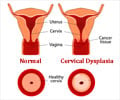
‘It is important for a women to be fully aware of HPV, cervical pre-cancer and cancer, screening guidelines and the need to be involved in continuous cervical cancer screening programs.’
Tweet it Now
The study included 576 women with normal findings on liquid-based cytology of the cervix who were followed for 9 years. During that follow-up period, 92 of the women developed high-grade pre-cancerous cervical changes and 4 women developed cervical cancer. These 96 women (cases) were compared with 480 women with normal findings on follow-up cervical cytology and matched by age (controls). All 576 baseline cervical samples were tested retroactively for HPV. The researchers found that a positive HPV finding was much more common among the cases than among the controls. For women younger than 30 years, only HPV16 and HPV18 were present significantly more often among cases than controls and were therefore associated with an increased risk of pre-cancerous cervical changes and cervical cancer. For women aged 30 years and older, other HPV types in addition to HPV16 and HPV18 conferred significant risk.
"These findings can help in the ongoing development of guidelines for cervical cancer screening. They strongly indicate that testing for HPV needs to be incorporated into screening programs," said principal investigator Sonia Andersson, MD, PhD, of the Karolinska University Hospital and Institute in Sweden. "Women younger than 30 with a positive HPV16 or HPV18 finding need to be closely followed, whereas other HPV types are much less likely to be associated with increased risk in these younger women. Among women above age 30, any HPV positive finding should be closely followed." Dr. Andersson also noted that women who are found to have pre-cancerous cervical changes should receive appropriate gynecologic treatment to help prevent the development of invasive cervical cancer. She emphasized that women need to fully participate in cervical cancer screening; to have accurate knowledge about HPV and cervical pre-cancer and cancer; and to be continuously informed about cervical cancer screening guidelines as they evolve.
Source-Eurekalert













